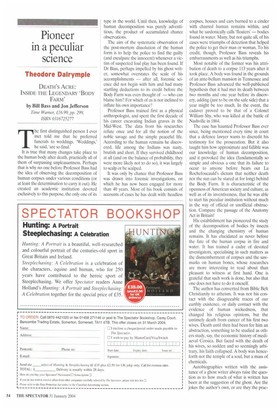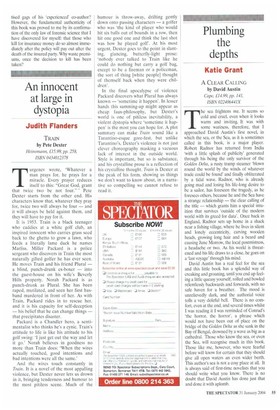Pioneer in a peculiar science
Theodore Dalrymple
DEATH'S ACRE: INSIDE THE LEGENDARY 'BODY FARM' by Bill Bass and Jon Jefferson Time Warner, £16.99, pp. 299, ISBN 0316725277 The first distinguished person I ever met told me that he preferred funerals to weddings. 'Weddings,' he said, 'are so final.' It is true that many changes take place to the human body after death, practically all of them of surpassing unpleasantness. Perhaps that is why no one before Professor Bass had the idea of observing the decomposition of human corpses under various conditions (or at least the determination to carry it out). He created an academic institution devoted exclusively to this purpose, the only one of its
type in the world. Until then, knowledge of human decomposition was purely adventitious, the product of accumulated chance observations.
The aim of the systematic observation of the post-mortem dissolution of the human form is to help the police to find the guilty (and exculpate the innocent) whenever a victim of suspected foul play has been found. If Dr Bass, perhaps impelled by his ghost writer, somewhat overstates the scale of his accomplishments — after all, forensic science did not begin with him and had many startling deductions to its credit before the Body Farm was even thought of — who can blame him? For which of us is not inclined to inflate his own importance?
Professor Bass trained first as a physical anthropologist, and spent the first decade of his career excavating Indian graves in the Mid-West. The data from his researches refute once and for all the notion of the noble savage and the simple peaceful life. According to the human remains he discovered, life among the Indians was nasty, brutish and short. If they survived childhood at all (and on the balance of probability, they were more likely not to do so), it was largely to scalp or be scalped.
It was only by chance that Professor Bass was drawn into forensic investigations, on which he has now been engaged for more than 40 years. Most of his book consists of accounts of cases he has dealt with: headless corpses, houses and cars burned to a cinder with charred human remains within, and what he sardonically calls 'floaters' — bodies found in water. Many, but not quite all, of his cases were triumphs of detection that helped the police to get their man or woman. To his credit, though, Professor Bass reveals his embarrassments as well as his triumphs.
Most notable of the former was his attribution of death to a corpse 113 years after it took place. A body was found in the grounds of an ante-bellum mansion in Tennessee and Professor Bass advanced the well-publicised hypothesis that it had met its death between two months and one year before its discovery, adding (just to be on the cafe side) that a year might be too much. In the event, the cadaver proved to be that of a Colonel William Shy, who was killed at the battle of Nashville in 1864.
The case has haunted Professor Bass ever since, being mentioned every time in court that a defence lawyer wants to discredit his testimony for the prosecution. But it also taught him how approximate and fallible was our knowledge of human decomposition, and it provoked the idea (fundamentally so simple and obvious a one that its failure to occur to anyone before bears out La Rochefoucauld's dictum that neither death nor the sun can be stared at for long) behind the Body Farm. It is characteristic of the openness of American society and culture, as well as of its inventiveness, that he was able to start his peculiar institution without much in the way of official or unofficial obstruction. Compare the passage of the Anatomy Act in Britain!
His establishment has pioneered the study of the decomposition of bodies by insects and the changing chemistry of human remains. It has elucidated as never before the fate of the human corpse in fire and water, It has trained a cadre of devoted investigators, specialising in such matters as the dismemberment of corpses and the sawmarks on human bones, whose researches are more interesting to read about than pleasant to witness at first hand. One is grateful that such work is done, but also that one does not have to do it oneself.
The author has converted from Bible Belt Christianity to atheism. It was not his contact with the disagreeable traces of our earthly existence, or daily contact with the evidence of human wickedness, that changed his religious opinions, but the untimely death from cancer of his first two wives. Death until then had been for him an abstraction, something to be studied as others study, say, the economic history of mediaeval Corsica. But faced with the death of his wives, so sudden and so seemingly arbitrary, his faith collapsed. A body was henceforth not the temple of a soul, but a mass of chemicals.
Autobiographies written with the assistance of a ghost writer always raise the question as to how much of what is written has been at the suggestion of the ghost. Are the jokes the author's own, or are they the prac tised gags of his 'experienced' co-author? However, the fundamental authenticity of this book was proved to me by its confirmation of the only law of forensic science that I have discovered for myself: that those who kill for insurance money do so almost immediately after the policy will pay out after the death of the insured party. Why waste premiums, once the decision to kill has been taken?





























































































 Previous page
Previous page